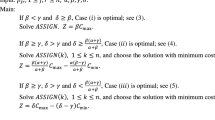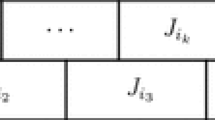Abstract
We study a scheduling problem involving both partitioning and scheduling decisions. A solution for our problem is defined by (i) partitioning the set of jobs into a set of accepted and a set of rejected jobs and (ii) scheduling the set of accepted jobs in a proportionate flow shop scheduling system. For a given solution, the jth largest due date is assigned to the job with the jth largest completion time. The quality of a solution is measured by two criteria, one for each set of jobs. The first is the total tardiness of the set of accepted jobs, and the second is the total rejection cost. We study two problems. The goal in the first is to find a solution minimizing the sum of the total tardiness and the rejection cost, while the goal in the second is to find a solution minimizing the total rejection cost, given a bound on the total tardiness. As both problems are \({\mathcal {N}}{\mathcal {P}}\)-hard, we focus on the design of both exact algorithms and approximation schemes.
Similar content being viewed by others
References
Chubanov, S., Kovalyov, M., & Pesch, E. (2006). An FPTAS for a single-item capacity economic lot-sizing problem with monotone cost structure. Mathematical Programming, Series A, 106, 453–466.
Cordone, R., Hosteins, P., & Righini, G. (2017). A branch-and-bound algorithm for the prize-collecting single-machine scheduling problem with deadlines and total tardiness minimization. INFORMS Journal on Computing, 30(1), 168–180.
Cordone, R., & Hosteins, P. (2019). A bi-objective model for the single-machine scheduling problem with rejection cost and total tardiness minimization. Computers and Operations Research, 102, 130–140.
Du, W., Eppstein, D., Goodrich, M. T., & Lueker, G. S. (2009). On the approximability of geometric and geographic generalization and the min-max bin covering problem. In F. Dehne, M. Gavrilova, J. R. Sack, & C. D. T òth (Eds.) Algorithms and Data Structures. WADS. Lecture Notes in Computer Science (Vol. 5664). Springer.
Du, J., & Leung, J. Y. T. (1990). Minimizing Total Tardiness on One Machine is NP-hard. Mathematics of Operations Research, 15, 483–495.
Gerstl, E., & Mosheiov, G. (2017). Single machine scheduling problems with generalised due-dates and job-rejection. International Journal of Production Research, 55(11), 3164–3172.
Gerstl, E., & Mosheiov, G. (2020). Single machine scheduling to maximize the number of on-time jobs with generalized due-dates. Journal of Scheduling, 23(3), 289–299.
Hall, N. G. (1986). Scheduling problems with generalized due dates. IIE Transactions, 18, 220–222.
Hall, N. G., Sethi, S. P., & Sriskandarajah, C. (1991). On the complexity of generalized due-date scheduling problems. European Journal of Operational Research, 51, 100–109.
Hermelin, D., Pinedo, M., Talmon, N., & Shabtay, D. (2019). On the parameterized tractability of single machine scheduling with rejection. European Journal of Operations Research, 273(1), 67–73.
Ibarra, O. H., & Kim, C. E. (1975). Fast approximation algorithms for the knapsack and sum of subset problems. Journal of the ACM, 22, 463–468.
Mor, B., & Mosheiov, G. (2018). A note: Minimizing total absolute deviation of job completion times on unrelated machines with general position-dependent processing times and job-rejection. Annals of Operations Research, 271(2), 1079–1085.
Mor, B., & Mosheiov, G.A Note: Flowshop scheduling with linear deterioration and job-rejection. 4OR- A Quarterly Journal of Operations Research. https://doi.org/10.1007/s10288-020-00436-z.
Mor, B., Mosheiov, G., & Shapira, D. (2019). Flowshop scheduling with learning effect and job rejection. Journal of Scheduling. https://doi.org/10.1007/s10951-019-00612-y.
Mor, B., & Shapira, D. (2020). Regular scheduling measures on proportionate flowshop with job rejection. Computational and Applied Mathematics, 39(2), 1–14.
Mosheiov, G., & Oron, D. (2004). A note on the SPT heuristic for solving scheduling problems with generalized due dates. Computers and Operations Research, 31(5), 645–655.
Oron, D. (2020). Two-agent scheduling problems under rejection budget constraints. Omega,. https://doi.org/10.1016/j.omega.2020.102313.
Qi, X., Yu, G., & Bard, J. F. (2002). Single machine scheduling with assignable due dates. Discrete Applied Mathematics, 122(1–3), 211–233.
Sahni, S. (1976). Algorithms for scheduling independent tasks. Journal of the ACM, 23(1), 116–127.
Shabtai, G., Raz, D., & Shavitt, Y. (2018). A relaxed FPTAS for chance-constrained knapsack. In 29th International Symposium on Algorithms and Computation.
Shabtay, D., Gaspar, N., & Yedidsion, L. (2012). A bicriteria approach to scheduling a single machine with rejection and positional penalties. Journal of Combinatorial Optimization, 23(4), 39–47.
Shabtay, D., Gaspar, N., & Kaspi, M. (2013). A survey on offline scheduling with rejection. Journal of scheduling, 16(1), 3–28.
Shakhlevich, N., Hoogeveen, H., & Pinedo, M. (1998). Minimizing total weighted completion time in a proportionate flow shop. Journal of Scheduling, 1, 157–168.
Sriskandarajah, C. (1990). A note on the generalized due-dates scheduling problems. Naval Research Logistics, 37, 587–597.
Tanaka, K., & Vlach, M. (1997). Single machine scheduling to minimize the maximum lateness with both specific and generalized due dates. Transactions on Fundamentals of Electronics, Communications and Computer Sciences, 80(3), 557–563.
Tanaka, K., & Vlach, M. (1999). Minimizing maximum absolute lateness and range of lateness under generalized due-dates on a single machine. Annals of Operations Research, 86, 507–526.
Wang, D., Yin, Y., & Jin, Y. (2020). Parallel-machine rescheduling with job unavailability and rejection. Omega, 81, 246–260.
Yin, Y., Cheng, S. R., Cheng, T. C. E., Wu, C. C., & Wu, W. H. (2012). Two-agent single-machine scheduling with assignable due-dates. Applied Mathematics and Computation, 219, 1674–1685.
Zhang, L., Lu, L., & Yuan, J. (2010). Single-machine scheduling under the job rejection constraint. Theoretical Computer Science, 411, 1877–1882.
Acknowledgements
The second author was supported by the Israel Science Foundation (grant No.2505/19), by the Recanati Fund of The School of Business Administration, and by Charles I. Rosen Chair of Management, The Hebrew University of Jerusalem, Israel.
Author information
Authors and Affiliations
Corresponding author
Additional information
Publisher's Note
Springer Nature remains neutral with regard to jurisdictional claims in published maps and institutional affiliations.
Rights and permissions
About this article
Cite this article
Mor, B., Mosheiov, G. & Shabtay, D. Minimizing the total tardiness and job rejection cost in a proportionate flow shop with generalized due dates. J Sched 24, 553–567 (2021). https://doi.org/10.1007/s10951-021-00697-4
Accepted:
Published:
Issue Date:
DOI: https://doi.org/10.1007/s10951-021-00697-4




